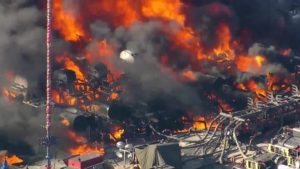The Urban Oil Field
Weld County, Colorado is one of the richest agricultural counties in the nation. It is also rich in oil and gas, leading to hundreds of wells extracting petroleum. With all that money around, Northern Colorado is booming, with people moving and subdivisions being built on what was farmland. The houses and wells are often neighbors, close neighbors. As oil companies put profit ahead of proper well management, disasters ensue. Colorado has lots of fires in the urban-wild land interface. In Weld County it is the urban-oil field interface.
Colorado is home to 48,000 active wells and 52,000 abandoned wells. All of them are potential fire and explosion hazards, and can release methane into the atmosphere. Think about that when your furnace comes on in the morning before you head out to your car. We need renewal energy.
The Denver Basin is a huge geologic feature extending along the eastern front of the Rocky Mountains. As the Rockies were uplifted, the Denver Basin subsided while filling with debris washing out of the mountains. There is a 22,000 feet difference between the bottom of the Basin and the summits of the mountains. That is a lot of gravel.
When there is a lot of structure in geologic formations, there is opportunity for oil and gas to migrate into the rocks. The Denver Basin is one of the largest gas fields in the United States. Oil and gas extraction started in 1901 in Boulder County. Trillions of cubic feet of gas and millions of gallons of oil have come out of the ground since then. Most of the production has come from sandstone or fractured shale. The development of horizontal drilling and fracking has accelerated the process. In Weld County, sites with as many as five wellheads and the installations to process the gas are next to residential areas.
The result is spectacular explosions and fires near where people live. Local fire departments, once used to fighting grass and barn fires, have sprayed thousands of gallons of firefighting foam on the fires and spent days on the fire scenes. Attempts to increase regulation of the industry mostly fail due to the political clout of the oil and gas industry. The politics may change with the election of Democrats to most of the state offices.
Keep in mind the oil bonanza is a major source of Colorado’s economy and growth. The move to renewables is also a source of revenue to the region, but there will be inevitable disruption during the transition. The oil and gas industry seems to be focused on keeping the wells flowing, regardless of the environmental consequences. They do not seem to be shifting into renewals themselves, which may be a death knell. Market forces will probably prove to accelerate the shift to renewables. They are much cheaper than dragging fossil fuels out of the ground and pouring tremendous amounts of carbon into the atmosphere. The remains of dinosaurs and ancient swamps need to stay in the ground.

